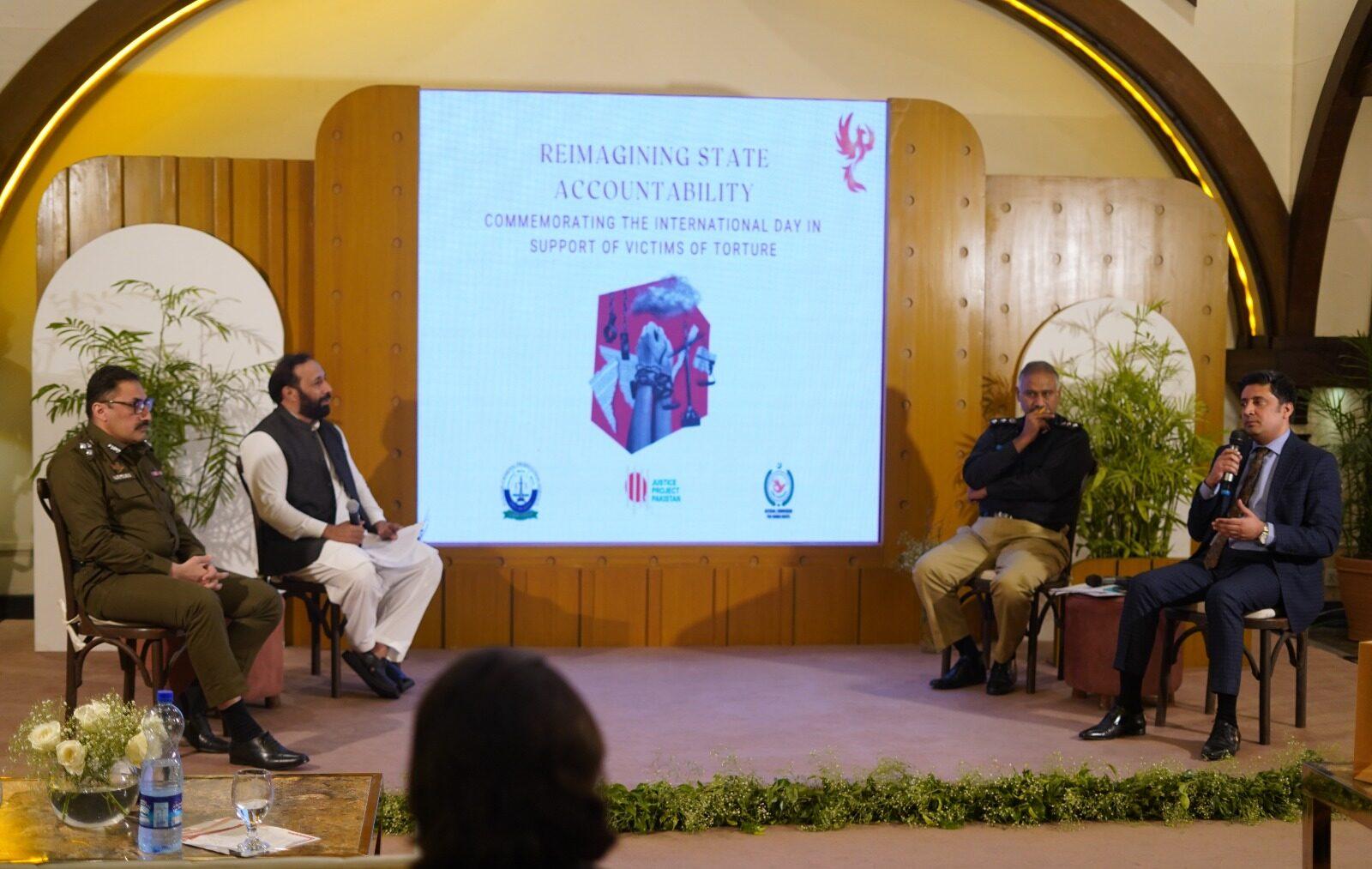The International Day in Support of Victims of Torture was marked in Lahore by a landmark event: the launch of “Reimagining State Responsibility: Training Manual for Torture Prevention” developed by the National Commission for Human Rights (NCHR) in collaboration with Justice Project Pakistan (JPP) at Faletti’s Hotel, Lahore. Organised in partnership with the Punjab Criminal Prosecution Service, the event brought together senior officials from across the criminal justice system to build a shared understanding of how to operationalise Pakistan’s anti-torture law.
This is the first time in Pakistan’s history that key stakeholders responsible for implementing the Torture and Custodial Death (Prevention and Punishment) Act, 2022—including the superior judiciary, NCHR, Prosecution, and medico-legal officials—have come together to take joint ownership of torture prevention. Their collective presence signals the Punjab government’s commitment to closing the implementation gap through inter-agency coordination and rights-based training.
The manual is the first of its kind in Pakistan, designed to guide public officials—police, prosecutors, prison authorities, medico-legal officers, and judges—on their responsibilities under the Torture and Custodial Death (Prevention and Punishment) Act, 2022, and international standards including the UN Convention Against Torture (UNCAT), Istanbul Protocol, Minnesota Protocol, and Méndez Principles. It comes in response to the May 2025 List of Issues issued by the UN Committee Against Torture, which called for information on Pakistan’s training measures and implementation of international safeguards. The manual directly addresses these gaps.
The event featured remarks from Honourable Justice Farooq Haider of the Lahore High Court, who leads the full bench examining implementation of the 2022 Torture Act, as well as Sarah Belal (JPP), Nadeem Ashraf (NCHR Punjab), and Prosecutor General Punjab Syed Farhad Ali Shah. All underscored the need to align domestic law with international obligations through training, oversight, and collaboration.
Two panels reflected this inter-agency collaborative approach. The first, with DIG Police Kamran Adil, AIG Prisons Asghar Ali, and FIA Lahore Director Sarfaraz Virk, focused on law enforcement’s responsibilities in preventing and investigating torture. The second, featuring Dr. Farhat Sultana (Surgeon Medico-Legal Punjab) and forensic expert Dr. Khurram Sohail Raja, explored how medical professionals can use international standards in their documentation and litigation.
“This training manual is more than a publication—it is a roadmap for the state to meet its responsibilities,” said Sarah Belal, Executive Director of Justice Project Pakistan. “Working alongside our esteemed partners, we have developed a comprehensive training framework that complies with Pakistan’s key international obligations.”
Honourable Justice Farooq Haider of the Lahore High Court, stressed the need for deep reflection on why the Act was not operationalised yet, suggesting the establishment of provincial inquiry commissions under the Lahore High Court to examine complaints of torture. Syed Farhad Ali Shah, Prosecutor General Punjab, emphasised the critical role of prosecution in holding perpetrators accountable, stating that he had notified guidelines to all of Punjab’s prosecutors to transfer any case of torture to the FIA.
Nadeem Ashraf, Member (Punjab), NCHRstressed the need for the passage of official rules, in line with domestic and international obligations, under the Act, saying that proper implementation could only happen once they were notified. Dr. Sultana and Dr. Raja highlighted the need for better training for medico-legal professionals on identifying torture.
DIG Kamran Adil, AIG Asghar Ali, and FIA Lahore Director Sarfraz Virk all pledged the support of law enforcement authorities in countering torture, and expressed their commitment to promoting training of their relevant agencies.
A key feature of the event was the introduction of the international launch of the Global Torture Index by the World Organisation Against Torture (OMCT) to the attendees, a groundbreaking tool that monitors seven key dimensions of torture prevention, from political commitment and detention conditions to victim redress and accountability mechanisms. For Pakistan, this Index provides a crucial baseline for improving safeguards.
The launch of the training manual signals a shift from abstract legal commitments to practical, cross-sector implementation. With Pakistan’s 2026 review on compliance with the UN Convention Against Torture on the horizon, and continuing GSP+ scrutiny, this initiative reflects a serious institutional effort to build internal accountability and equip public officials with the tools needed to end the normalisation of torture in Pakistan’s justice system.







